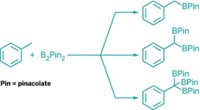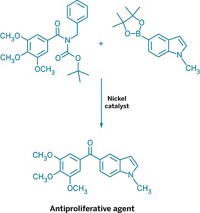Advertisement
Grab your lab coat. Let's get started
Welcome!
Welcome!
Create an account below to get 6 C&EN articles per month, receive newsletters and more - all free.
It seems this is your first time logging in online. Please enter the following information to continue.
As an ACS member you automatically get access to this site. All we need is few more details to create your reading experience.
Not you? Sign in with a different account.
Not you? Sign in with a different account.
ERROR 1
ERROR 1
ERROR 2
ERROR 2
ERROR 2
ERROR 2
ERROR 2
Password and Confirm password must match.
If you have an ACS member number, please enter it here so we can link this account to your membership. (optional)
ERROR 2
ACS values your privacy. By submitting your information, you are gaining access to C&EN and subscribing to our weekly newsletter. We use the information you provide to make your reading experience better, and we will never sell your data to third party members.
Synthesis
Ironing Out Carbonyl Reduction Reactions
Iron phosphinoamidinate catalyst provides a more versatile and efficient hydrosilylation of carbonyls, including esters, to make alcohols
by Stephen K. Ritter
October 21, 2013
| A version of this story appeared in
Volume 91, Issue 42
Reducing carbonyl compounds to make alcohols is among the most widely used reactions in lab and industrial organic synthesis. One approach involves heating an aldehyde or ketone with a silane reducing agent and platinum-group catalyst to create a hydrosilyl intermediate that is hydrolyzed to form the alcohol. In an industry-academic collaboration, a research team has now developed an iron catalyst for carbonyl hydrosilylations that is less expensive than platinum-group catalysts, requires less catalyst, and works on a broader range of carbonyl compounds than previously reported (Organometallics 2013, DOI: 10.1021/om400883u). Building on recent developments on N-phosphinoamidine ligands, the researchers, led by Mark Stradiotto and Laura Turculet of Dalhousie University, in Halifax, Nova Scotia, and Orson L. Sydora of Chevron Phillips Chemical, in Kingwood, Texas, developed the new iron catalyst (shown). The team’s hydrosilylations run at room temperature and require only 1 mol % or less of catalyst and only one equivalent of phenylsilane. Besides working efficiently on a variety of aldehydes and ketones under mild conditions, the reaction also converts esters to alcohols, which is a first for iron-catalyzed hydrosilylations.





Join the conversation
Contact the reporter
Submit a Letter to the Editor for publication
Engage with us on Twitter